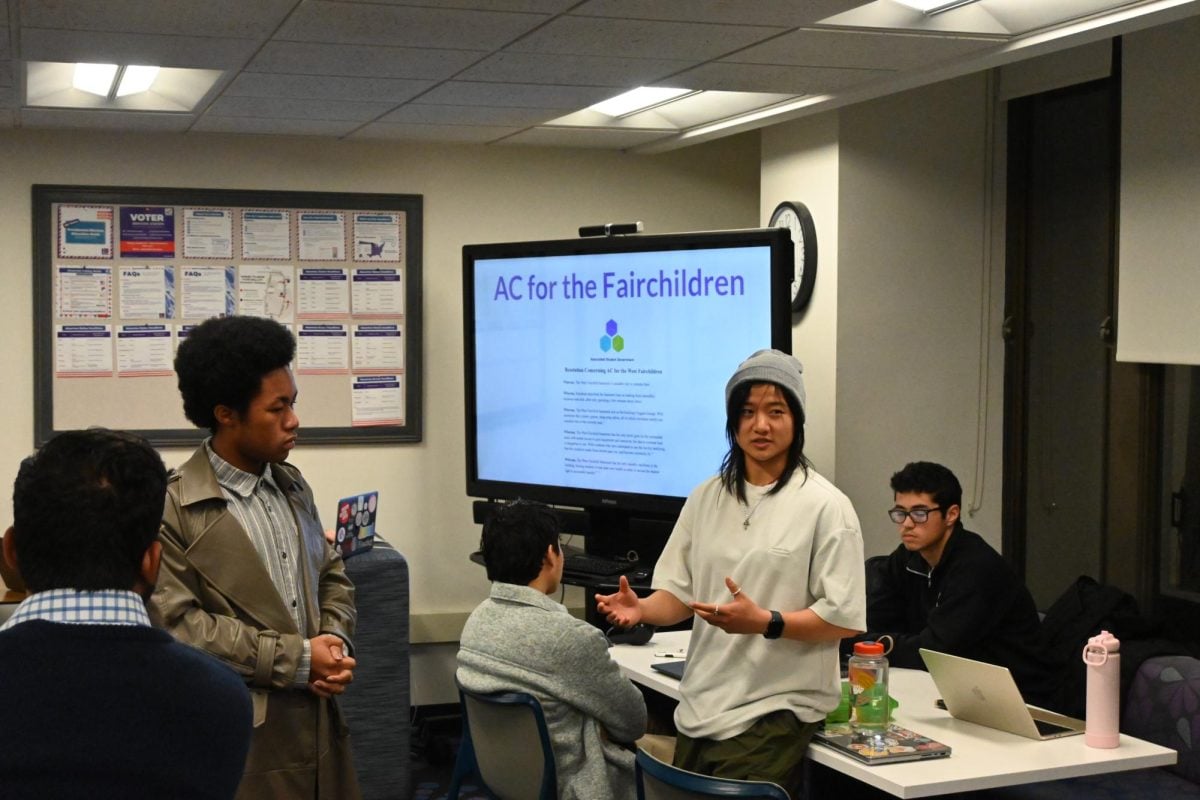The Associated Student Government’s Wednesday’s meeting included the passing of two pieces of legislation and a proposal to extend dining hours, as well as a resolution to advocate for improved heating conditions in a residential college basement.
Weinberg junior Ty’Shea Woods also announced her resignation as ASG co-president at the start of the meeting. While Woods did not provide specific details regarding her decision, she expressed gratitude for her time on ASG and a desire to serve others on a new path aligning with her faith in her letter of resignation.
The meeting began with a vote on legislation proposed during the Nov. 6 meeting, both of which passed. Afterward, senators introduced two new pieces of legislation.
Communication sophomore Asha Navaratnasingam led the presentation of the first new legislation for the night, which proposed extending dining hours at Foster-Walker Complex, known as Plex, on weekends. The legislation recommends adjusting the hours from the current 10 a.m. to 8 p.m. to new hours of 12 p.m. to 10 p.m. on Fridays and weekends.
There are many students with dietary restrictions who cannot eat at dining areas open later in the evening, such as Fran’s Cafe and Lisa’s Cafe, Navaratnasingam said.
“I feel like a lot of students want their late night snacks, and that’s really hard to get,” Navaratnasingam said. “They use their own money to purchase them, and we already spend so much money on Northwestern that it’s not worth it.”
Navaratnasingam said even while the legislation targets one dining hall, the long-term goal is to extend hours at all dining halls. However, she said they needed to focus on getting approval for Plex first.
Navaratnasingam also expressed a desire to ensure that NU dining workers are in agreement with the new hours before taking further steps.
The next piece of proposed legislation was led by SESP freshman JJ Nabors-Moore, who introduced a proposal to address the heating issues in the basement of the International Studies Residential College.
Nabors-Moore shared that the issue caught his attention when he visited friends at the West Fairchild dorm. He said he went to the laundry room in the basement and immediately felt intense heat.
Although he doesn’t live in West Fairchild, Nabors-Moore said he was concerned about the situation and spoke with residents and the resident assistants there to gather more information for his legislation.
The legislation urges the administration and NU Residential Services to address the heating issues and resolve the temperatures in the basement. Nabors-Moore described the basement as “unusable,” recalling a conversation with a resident who tried to use the gym located there but nearly passed out due to the heat.
“(Students) deserve to have a basement that isn’t a danger to their health and deserve to have access to laundry, to have access to clean clothes, without risking their health,” Nabors-Moore said. “And I think that’s really a difficult thing to refute.”
The legislation also details a plan to move the laundry room temporarily to other areas in the residential college, which Nabors-Moore suggested could be open storage rooms, until the problem is resolved.
Nabors-Moore said he was informed by residential staff that the problem likely stems from the building’s heating system — but the exact cause is still uncertain.
If the legislation passes, Nabors-Moore said he plans to collaborate with the resident director there to implement a solution, though he anticipates that securing administrative approval could be challenging due to the potential costs involved.
ASG’s final order of business was conducting a training session to prepare senators for the Nov. 20 Funding Senate session. The meeting will consist of allocating money from ASG’s New Student Organization Support Fund.
NSOSF allocates $5,000 in funding to new organizations each quarter. For student organizations to qualify for funding, they must have been active for two years or less and have a Student Organization Finance Office account.
Organizations submit a document outlining their funding needs, including the lower bound, the minimum amount they would request, the upper bound, the maximum amount they are seeking, and the specific amount they need to carry out their events or activities.
The Funding Senate consists of three main rounds referred to as the “add, cut, add” rounds. Throughout the rounds, senators allocate funds, cut back on the allocations and add back any remaining funds.
SESP sophomore Gauri Adarsh, deputy co-chair of the Student Activities Finance Committee, said she thinks the biggest challenge for senators at this Funding Senate will be limiting how much they give each group.
Adarsh said that often, senators are eager to support every group, but the limited funding means they can’t give to everyone as much as they’d like. Her best advice to senators, which she said she once received in an administration meeting, is to focus on “depth or breadth.”
“Depth is when it really feels like it’s a hard-hitting event that people will remember and is a critical part of their time here … or breadth, which affects a lot of people,” Adarsh said. “We love it because it affects a lot of different civilians on campus who are excited, even if it’s not affecting them deeply.”
Email: [email protected]
Related Stories:
— ASG elects Election Commission members, introduces new legislation and code reforms
— ASG Senate passes legislation to honor alumni veterans and approve Election Commission guidelines
— ASG Senate implements trial run to modify weekly meeting structure, selects Election Commission






